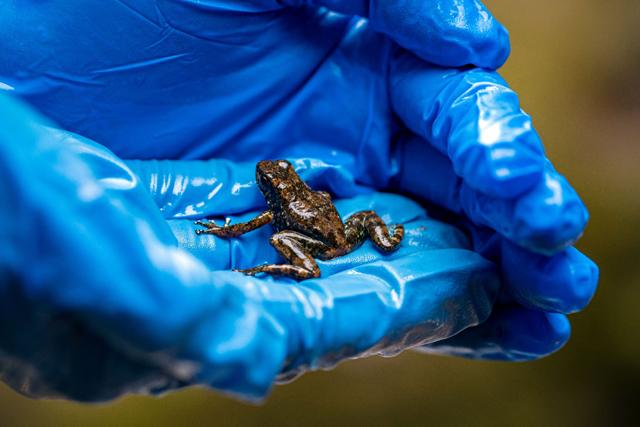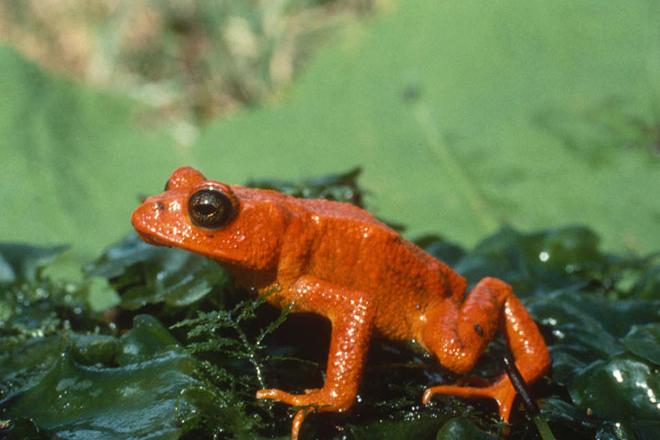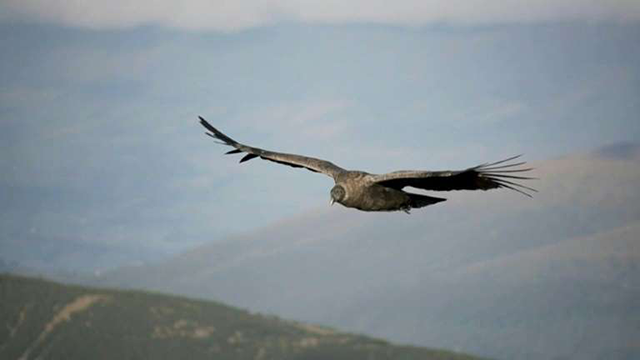You are here
Ecuadoran frogs Rocket and Harlequin taking on mining industry
By AFP - Jun 06,2022 - Last updated at Jun 06,2022

Biologist Andrea Teran holds a new species of rocket frog in her hands by the Velo de Novia waterfall in Junín, Ecuador, April 2022 (AFP photo)
JUNÍN, Ecuador — On the banks of a crystalline waterfall, biologist Andrea Teran lets out a yelp.
She holds in the palm of her hand one of two frog species at the centre of a legal battle against Ecuador's mining industry.
Teran, 37, is a specialist in the fragile existence of a creature called the Resistance Rocket Frog, which does not yet have a scientific name, and the Longnose Harlequin (Atelopus longirostris), which was believed extinct for 30 years.
The discovery several years ago of these two tiny frogs measuring no more than four centimeters has become the central argument in opposition to a proposed nearly 5,000 hectare mining project in a native forest in Junin, Imbabura province, around three-and-a-half hours north of Quito.
The Longnose Harlequin reappeared in 2016.
"It was a frog that came back from the dead," said an emotional Teran, whom AFP accompanied on an expedition in this forest area following a two-hour walk.
"If the water is polluted [by mining] the last populations of this frog will be lost," said the biologist from the Jambatu Centre dedicated to the study and conservation of amphibians.
The Longnose Harlequin is extinct according to the International Union for the Conservation of Nature's red list.
But scientists rediscovered traces of life in this forest where the mineral exploitation license was granted to Ecuador's Enami and Chile's Codelco. They are due to begin in 2024 to extract 210,000 tonnes of copper a year.
In Ecuador, which launched a massive mining exploitation operation in 2019, there are at least 12 projects at advanced stages to mine reserves of 43.7 million ounces of gold, 46 billion pounds of copper and 183 million ounces of silver, according to the Spurrier Group consultancy.
But the 2019 discovery of a new species of rock frog has only intensified the desire to protect its forest habitat.
Last hope
In 2020, Teran launched a legal battle to prevent the mining project from going ahead.
Although she succeeded in the first instance, she then lost on appeal.
But the mining concession has also been challenged by a collective of Junin residents pointing to errors in the environmental impact studies, such as the lack of a protection plan for the two frog species.
"There are so many mistakes. They are violating the rights of nature, and on top of that the documents were never correctly communicated to the community and there was no environmental consultation," the file's lawyer Mario Moncayo told AFP.
But a judge rejected the claim of oversights.
Defenders of these two frogs can still appeal, which is perhaps their last hope of halting the mining project.
Contacted by AFP, both the government and the mining companies refused to comment.
No solutions
When the Jambatu Centre scientists came across the new rocket frog species they initially mistook it for one called the Confusing Rocket Frog (Ectopoglossus confusus).
However, an anatomical difference in its tongue was found, and genetic studies allowed experts to identify it as a completely new Ectopoglossus species that they named "resistance".
"It lives in unique conditions, with the sound of the waterfall we don't know how it communicates, we don't know anything about its reproductive biology," said Teran.
Their skin contains great medicinal potential, and renders them extremely sensitive to environmental changes.
They are thus considered bioindicators, meaning that if the ecosystem is affected, they could disappear.
Protection of nature is enshrined in the constitution of Ecuador, which has 650 known species of frogs, 60 per cent of which are in danger of extinction.
But the South American country derives 6 per cent of its GDP from its oil and mining industries, according to the Central Bank.
"We are in a mega-diverse region and the decisions taken have to be mega-responsible", said Teran.
It's an issue that divides opinion in Junin.
"If authorities value the species that live here then they need to halt" the mining project, said farmer Hugo Ramirez, 40.
But for carpenter Pedro Vallejos, 63, environmentalists are offering no solutions to end poverty.
"There's no employment in the countryside, there are no alternatives," he said.
Related Articles
PARIS — Those lucky enough to have seen them will never forget.For just a few days every year, the elfin cloud forest of Costa Rica came ali
QUITO — On a rocky outcrop in an Ecuadoran nature reserve, a pair of prolific Andean condors are giving conservationists a glimmer of hope t
WikiLeaks founder Julian Assange, who has spent over two years in Ecuador's London embassy to avoid a sex crimes inquiry in Sweden, said on Monday he planned to leave the building "soon", but Britain signalled it would still arrest him if he tried.
















